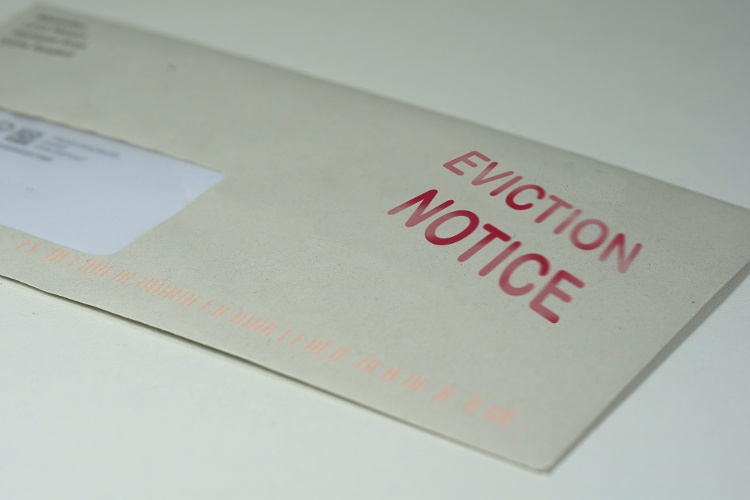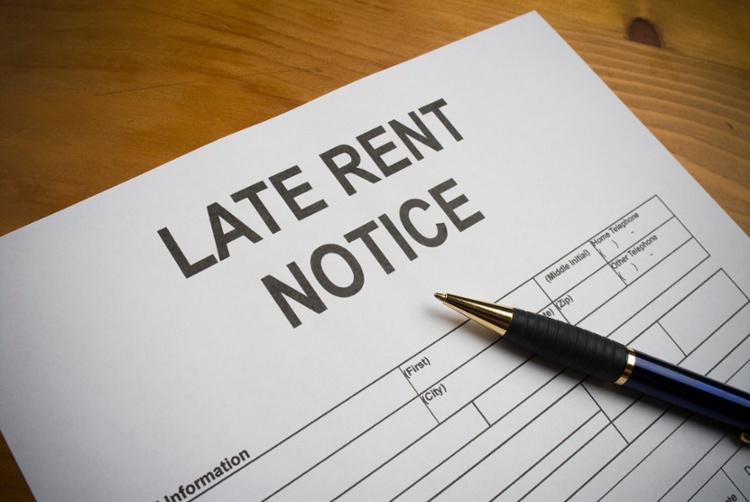When you own rental property you’re bound to have a situation where the tenant pays the rent late. Maybe they’re out of town, the rent check may have been lost in the mail, or they simply forgot about the rent.
Regardless of the reason for late rent payments, it’s important to protect your rights as a landlord when the rent isn’t paid on time by sending a late rent notice to the tenant. In this article, we’ll explain how a late notice works, and why a late rent notice is such a critical document for landlords to use.
What Does a Late Rent Notice Mean?
A late rent notice is a written notice or letter sent to the tenant by the landlord notifying the tenant that the rent is past due. The late rent notice serves three purposes.
First, it puts the tenant on notice that they have violated a term in the lease requiring the rent to be paid by a certain date and gives the tenant a chance to cure the situation by paying the past due rent in full.
The second reason for sending a late rent notice to a tenant is to document the fact they've paid the rent late. Everyone forgets things every now and then, so the tenant may never pay the rent late again. But if they end up paying consistently late month after month, the late notices sent will document their habitual late-pay behavior and may be used as evidence to terminate the lease (if your lease and the state landlord-tenant laws allow).
Third, sending a late rent notice is the first step in the eviction process. Ideally, the tenant will pay and you won’t need to evict. However, it's a fact of life in the rental real estate business that sometimes you will end up with a bad tenant despite having a thorough tenant screening process in place.

How Many Days Can a Tenant be Late on Rent?
The time between the rent due date and the date the rent is late is known as the ‘grace period.’
The reasoning behind giving the tenant a grace period is that sometimes there is a delay in the delivery of the payment, such as slow mail delivery or the bank not posting a deposit until the following business day. To avoid payment delays, many landlords use a free online rent payment service such as Cozy, RentTrack, or Zillow Rental Manager.
How a Grace Period Works
As a rule of thumb, a standard grace period is between two to five days before the rent is technically delinquent and a late notice is sent.
Some states have a legally mandated grace period, while other states leave it up to the landlord to decide if they want to offer a grace period and the number of days in the grace period. Your local property manager and state landlord-tenant laws will explain how the grace period for your market works.

When to Send a Late Rent Notice
A late notice should be sent the day following the expiration of the grace period. For example, if your lease agreement states that “the rent is due on the 1st of each month and past due on the 3rd day of the month” the notice should be dated and postmarked on day number three.
Sometimes landlords hold off a day or two before sending a late notice, especially if it’s the first time the tenant has paid late.
While the thought is nice, a landlord should send a late rent notice as soon as possible. If the tenant has never paid late before, you can always send the notice and then give the tenant a friendly courtesy call, advising them that the late notice has been sent as part of your standard operating procedure.
The problem with being flexible with the grace period is that the tenant may fall into a bad behavior pattern of paying the rent late. A late-paying tenant affects your cash flow and potentially causes you to pay your bills late as well, which is a situation that every landlord wants to avoid.
Can Landlords Charge a Late Rent Fee?
Provided your lease and landlord-tenant laws allow, it’s perfectly legal for a landlord to charge a tenant a late fee. The rationale for charging a late rent fee is to compensate the landlord for the time and trouble of having to send a late rent notice and to serve as an incentive for the tenant to pay the rent by the due date going forward.
.jpg?width=2121&name=iStock-903035430%20(1).jpg)
How to Set a Late Fee Amount
A late fee amount should be large enough to penalize the tenant for paying the rent late, but not so large that the tenant has trouble keeping up future rent payments. The late fee amount can be a certain percentage of the monthly rent, such as 5%, or a fixed fee equal to the same amount. So, if the monthly rent is $1,500, the late fee would be $75.
When to Charge a Late Fee
The late fee should be charged as soon as possible after the due date or the grace period ends. If you don’t have a grace period, the late fee would be charged on the 2nd day. If you have a three-day grace period, you will charge the late fee on the 4th day.
Drawbacks to Accepting Partial Rent
Once you charge a late fee the total amount of rent due increases. Using the example above, the total rent the tenant must pay to become current is now $1,575 ($1,500 rent + $75 late fee).
What happens if the tenant only pays $1,500 and you accept the payment?
By accepting less than the actual amount of rent due, you are sending a signal to the tenant that the late fee is negotiable when it really isn’t. Also, if you are in the middle of an eviction process, you will have to start over again because you accepted a partial rent payment from the tenant.

How to Write a Late Rent Notice
A late rent notice should include the following information:
- Name of tenant or tenants on the rental agreement
- Name of landlord or property manager
- Location of the property
- Date late rent notice is issued
- Amount past due
- Late fee amount
- Total amount of rent due to become current
- Due date of total rent before eviction process begins
- Form of payment for the total rent due (to avoid an NSF check)
- Consequences of failing to pay the rent in full and for continuing to pay late
- Signature of landlord or property manager
Be sure to keep a copy of the notice sent in the tenant file, including proof that the notice was delivered to the tenant, such as certified mail with return receipt requested. You will need this should the tenant continue to pay the rent late and you decide to evict.
Free Late Rent Notice Forms
You can download free late rent notice forms in Word Doc and PDF formats from the following websites, or simply search online for “late rent notice form +Your State”:
- Apartment Guide late rent notice
- eForms notice to pay or quit form for late rent
- ezLandlordForms late rent notices to tenants
- LegalTemplates free late rent notice
- RentPrep 5 free forms for landlords
- TemplateLab 34 printable late rent notice templates
- Zillow free landlord notice templates
Many real estate attorneys who specialize in residential evictions have free forms available for download on their websites. Avvo and LawInfo are two good sources for finding eviction lawyers in the state your property is located in.

How to Evict a Tenant for Not Paying the Rent
Let’s take a quick look at how the eviction process works, along with two less expensive alternatives to evicting a tenant.
The process for evicting a tenant differs from state to state. In general, there are eight main steps to follow when evicting a tenant:
- Know your local landlord-tenant laws.
- Make sure your reason for evicting the tenant is valid.
- Speak with the tenant in person.
- Deliver a written eviction notice.
- File the eviction in court.
- Prepare documents and attend the court hearing.
- Evict the tenant using local law enforcement services.
- Obtain a judgment and collect past due rent.
Alternatives to Evicting a Tenant
Evicting a tenant is time-consuming and expensive. The entire process can take 30 – 60 days, depending on the city your property is located and the time of year.
According to TransUnion SmartMove and BiggerPockets, the average cost of an eviction ranges from $3,500 to $7,000. These amounts include legal fees and court costs, lost rent, damage caused by the evicted tenant, and marketing and leasing expenses for finding a new and better tenant.
Obviously, it makes good business sense if you can avoid legal action entirely and get the tenant to willingly leave the premises. There are two good alternatives to evicting a tenant:
- Talk the tenant into leaving by meeting with the tenant face-to-face. Consequences to being evicted include a bad credit report, garnished wages for the past rent due, and a bad rental history report.
- Offer the tenant cash for keys by paying them to leave. With the average cost of an eviction running into the thousands of dollars, giving the tenant money to leave lets you cut your losses and re-rent the property to a more qualified tenant who will pay the rent on time.
Tips for Getting a Tenant to Pay Rent On Time
Sometimes tenants pay the rent late because they have no choice. Maybe they’ve lost a job, had a medical emergency, or a change in family status.
However, there are also several things a landlord can do to get a tenant to pay the rent on time and avoid having to charge a late fee:
- Set a fair market rent for your property compared to similar homes in the area by using tools such as Rentometer.
- Thoroughly screen all potential tenants by conducting a background check, running a credit report, and pulling a rental history.
- Review the terms and conditions of the leasing with the tenants, and remind them again of their responsibilities when doing the move-in inspection with the tenants.
- Make it easy for your tenants to pay their rent on time and avoid late fees by using an online rent payment tool such as PayRent and RentTrack that reports on-time rent payments to the credit bureaus and disallow partial rent payments.
- Keep the lines of communication open with your tenants so that they receive a quick response to any maintenance requests or have questions about renewing their lease.
Final Thoughts on Dealing with Late Rent
A late rent notice is an important document landlords use to train tenants to pay their rent on time, and to use as the first step if a tenant has to be evicted.
The late notice is sent to the tenant if rent isn’t paid in full by the due date, and normally includes a late fee to compensate the landlord for the time and trouble of sending a late rent notice.
You can avoid having to send a late rent notice by making it easy for tenants to pay their rent online and by ensuring your rent is fair and at market.









